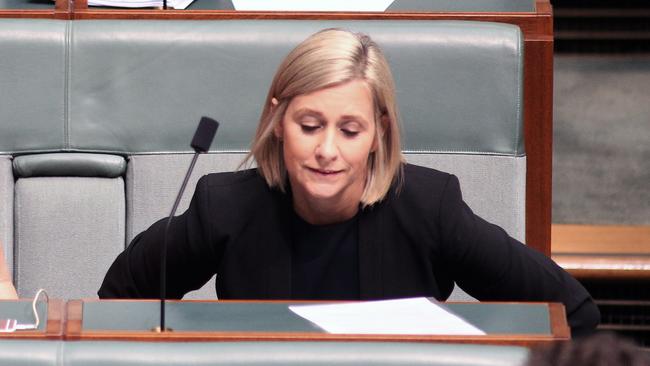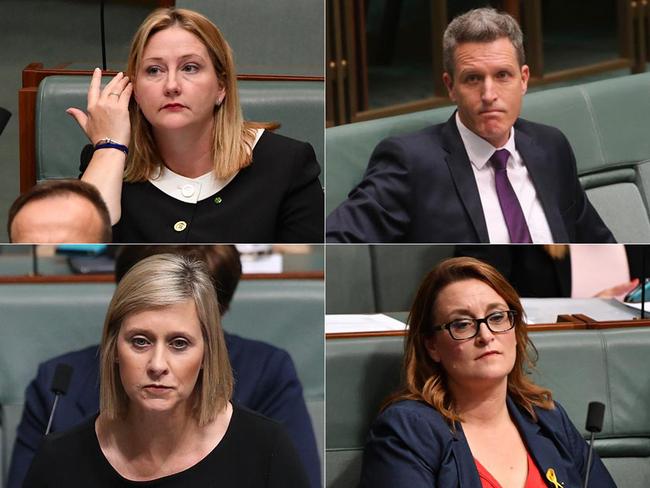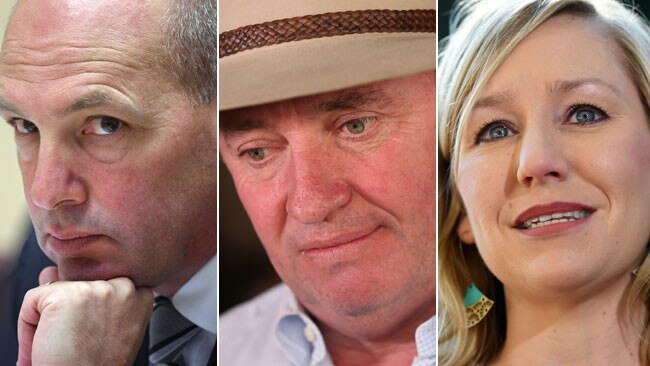Citizenship debacle: Bill Shorten to face leadership test
After months of denying any Labor MP was under a cloud, Bill Shorten is engulfed in crisis as he faces five by-elections.

Bill Shorten’s leadership will be put on trial in a “Super Saturday” of five simultaneous by-elections, four of them triggered by the resignations yesterday of three Labor MPs and one independent in response to a ruling by the High Court on the parliament’s ongoing dual citizenship crisis.
The besieged Labor leader yesterday declared the string of by-elections — four of them in Labor-held seats and expected to be held on the same Saturday in either late June or early July — would double as an early referendum on the Turnbull government’s budget.
GRAPHIC: By-election battlegrounds
After more than seven months denying any Labor MP was under a citizenship cloud, the Opposition Leader yesterday was forced to face an extraordinary day in parliament that began with former ACT senator Katy Gallagher being ruled ineligible to sit in parliament, followed by the resignations of three lower house Labor MPs — Susan Lamb, Justine Keay and Josh Wilson. Centre Alliance MP Rebekha Sharkie also fell on her sword after acknowledging the ruling meant that she could not remain in parliament.
The political crisis engulfed Mr Shorten, whose leadership could hinge on the outcomes of the by-elections, ahead of his budget-in-reply speech tonight, which is expected to outline Labor’s alternative to Scott Morrison’s $140 billion seven-year personal income tax plan.
Senior party officials on both sides of politics conceded that the by-elections, which will also include the seat of Perth after the unrelated resignation of Labor MP Tim Hammond last week, could decide the fate of either leader.

If Mr Shorten were to lose one or two of the Labor-held seats, his leadership would come under intense pressure. But a senior Liberal MP warned: “Equally, if the Coalition vote went backwards in any of those contests, it would spark a major panic in the partyroom.”
Asked whether the by-elections would double as a referendum on company tax cuts, Mr Shorten said that, even if he lost seats, he thought the cuts were a “bad idea”.
He said Labor would explain to voters that “this hoax of a budget … which is all about giving large corporations billions of dollars in taxpayer money” would mean less money was available for schools, hospitals, debt “and indeed income tax relief for lower-paid Australians”.
The High Court yesterday returned after almost six months to rule that Ms Gallagher had been ineligible under section 44 of the Constitution to stand in the 2016 election because she was also a British citizen at the time of nomination. The three lower house Labor MPs and Ms Sharkie had the same British citizenship questions hanging over their heads.
With the surprise announcement last week by Mr Hammond that he was resigning from parliament due to family reasons, the Coalition and Labor could be forced to go head-to-head in five by-elections in what is being described as a “mini-election”.
The Australian understands Speaker Tony Smith cannot move the process to the next stage of deciding a date for the by-elections until the Labor MPs have formally resigned.
The decision by the Labor MPs not to submit their resignation letters until tomorrow has raised accusations that they will spend their final days as MPs using their taxpayer-funded printing allowances to print re-election material. Until Mr Smith signs off on the letters they also remain on their full entitlements.
Ms Sharkie, who is expected to struggle to hold on to Mayo, will request a by-election to be held on June 16 but The Australian understands the poll date could be pushed back to July.
By-elections in July would set up an electoral showdown weeks out from Labor’s national conference in Adelaide from July 26 to 28, where Mr Shorten will come under pressure on border protection, industrial relations and energy.
Mr Shorten tried to defend his refusal over the past six months to refer Labor MPs to the High Court, claiming yesterday’s judgment delivered a “new precedent”.
“In good faith, our candidates and the Labor Party and I have relied on advice that’s been the same advice for over 20 years,” Mr Shorten said. “But the High Court has looked at the facts in Senator Gallagher’s matter, they have developed a new test, a stricter test, and we have accepted that.”
This was disputed by the government, with Malcolm Turnbull claiming it simply reaffirmed a decision made last year in the first case against Coalition frontbencher Matt Canavan, who survived the section 44C test. That ruling prompted both Barnaby Joyce and Liberal MP John Alexander to resign their seats, which they successfully recontested.
“The High Court did not make a new ruling today, or a new interpretation,” the Prime Minister said. “They make it very clear that all they are doing is applying the principles set out in the Canavan case last year.”
Voters will face by-elections in Ms Keay’s seat of Braddon in Tasmania, Ms Lamb’s marginal seat of Longman in Brisbane’s north, Mr Wilson’s seat of Fremantle in WA, and Ms Sharkie’s seat of Mayo, to Adelaide’s east and south. All have claimed they will recontest their seats.
The government is hopeful in Mayo, where Howard government minister Alexander Downer’s daughter Georgina will run for the Liberal Party in the seat once held by her father.
Labor also faces a tough contest in Longman, which Ms Lamb won from the LNP in 2016 on the back of One Nation preferences.
Ms Gallagher, who had referred herself to the High Court in December, unlike her lower house colleagues, argued she had done all that was required by British law to renounce her citizenship, and that British authorities had been an “irremediable impediment”.
The court found a person could not argue they were prevented from renouncing their citizenship “merely because a decision might not be provided in time for a person’s nomination”.
The federal budget put the “legal costs of constitutional matters” associated with the citizenship crisis at $11,625,000.






